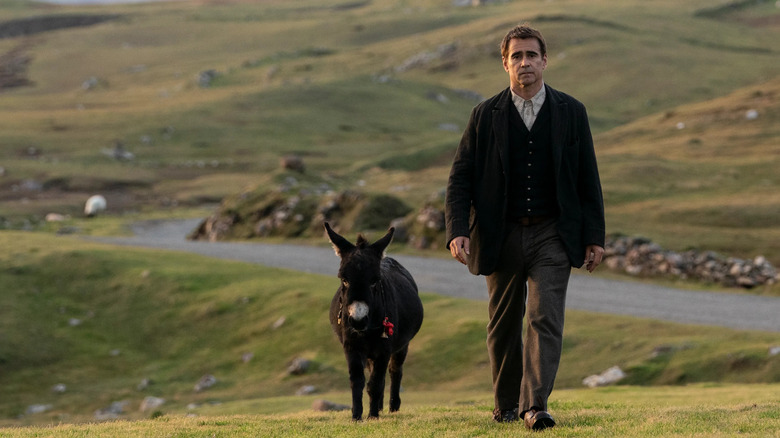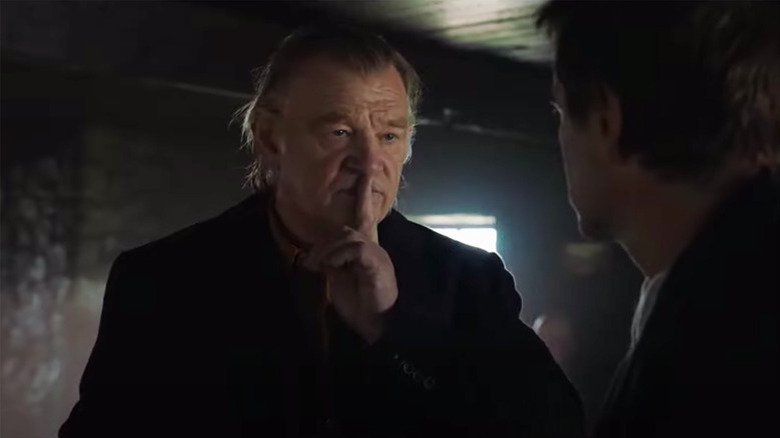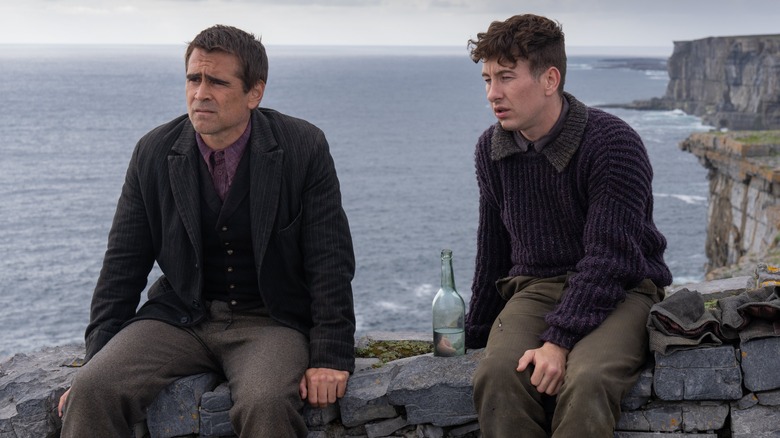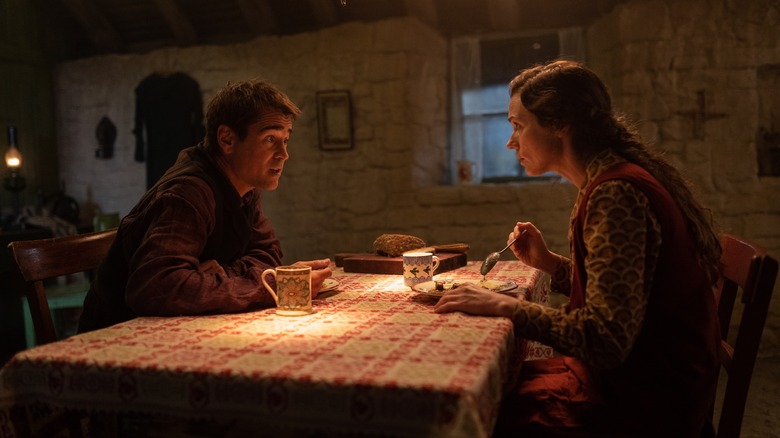The Banshees Of Inisherin Proves Niceness Isn't Enough - Even If You're Colin Farrell
As language is written and spoken over and over again, it evolves. In recent years, "Nice guy" has morphed into a cutting backhanded compliment. It's often used synonymously with two-faced, people who conceal their own insecurities and entitlement with politeness.
"The Banshees of Inisherin" shows a different reason for the social deficiencies of "nice guys." Pádraic Súilleabháin (Colin Farrell) spends the movie trying to mend bridges with his buddy Colm Doherty (Brendan Gleeson), who's decided he doesn't want the two of them to be friends anymore. Pádraic is rebuked because Colm's problem isn't with anything his former friend has done; it's with who he is. Pádraic is a "nice guy," one who's always pleasant and ready with a helping hand, but all he does is farm, drink, and small talk. Colm, who's dealing with a mid-life crisis, decides he has no time left for such dullness.
There's nothing wrong with being nice, far from it. On its own, though, niceness is not enough to be a likable or interesting person. Pádraic's character demonstrates why.
Smaller and smaller talk
/Film has previously written how "Banshees" is about communication and failures thereof. Pádraic and Colm have been talking for 20 years, but it seems they've never shared all that much. They're drinking buddies and small talkers, but what brought them together was the smallness of Inisherin and their own fears of loneliness. Now, Colm is more afraid of being forgotten, so he'd rather compose music than chat with Pádraic about nothing at all.
It's impossible not to feel sorry for Pádraic. When Colm tells him he no longer likes him, Farrell's face agonizingly contorts in baffled anguish. He can only mutter, "You do like me." True to his niceness, he offers an apology without even knowing what possible offense it would be for, just to smooth things over with Colm. /Film's Jacob Hall has called "Banshees" a break-up movie; if you've ever been in Pádraic's shoes, trying to mend bridges with someone who keeps tearing them down, his struggle becomes heartbreaking.
Colm's behavior does reveal a harsh truth, though: the nicest people don't often make for the best conversationalists. Let's ask ourselves a question — what is it that makes a person nice? They're usually agreeable and polite, so not the most exciting people to talk to. Rather than risk stepping on other people's toes or a disagreement, they'll say little, keep away from scratching even the surface, or just agree with their dialogue partner. A nice person will always be there for you but they might not ever make you laugh or forge a truly meaningful connection with you.
Just nice
When Colm tells Pádraic's sister Siobhán (Kerry Condon) that he finds her brother dull, this is all she can muster in defense: "He's always been dull." Therein lies the problem with Pádraic's niceness; it's real but there's nothing else to his personality. Colm bitterly notes that in one of his last conversations with Pádraic, all the former did was spend 2 hours telling Colm about, "the things he found in his little donkey's **** that day."
Even genuinely "nice guys" are often complacent and disinterested in change. That's Pádraic, who can't move on from Colm and who refuses Siobhán's offer to leave Inisherin even as things get worse for him. Niceness isn't a panacea to being a good or well-liked person. There are so many other, more distinctive qualities a person can have: funny, inquisitive, brave, ambitious, or artistic. None of them are mutually exclusive with being nice, either. Pádraic doesn't realize he needs more than niceness to be a complete person.
Nice or passionate
It's telling that Colm is fondest of Pádraic when he stops being the nice guy. He says that he likes Pádraic better when he's drunk, for one. After Pádraic curses him out at the pub, Colm jokes that was the most interesting conversation they've ever had — "I think I like him again."
Colm isn't exactly a nice guy himself. When he goes to confession, the village priest (David Pearse) confronts him over abandoning Pádraic. Colm says what he's doing isn't sinful, and while the priest agrees, he says it's not exactly nice either. Colm brushes that off. While Colm's lacks Pádraic's decency, he has passion, manifested in his music. Colm threatens (and follows through) to cut off his fingers if Pádraic doesn't leave him be. It's a perfect encapsulation of how depression makes you hurt yourself; Colm won't be lesser just because of his missing fingers, but because he won't play his fiddle ever again.
Pádraic, on the other hand, clearly never took much interest in Colm's music. He doesn't know who Mozart is, even though his friend admires the man. He does ask for the name of Colm's completed composition, but as usual, it's all small talk.
Does anyone on Inisherin have the proper blend of niceness and passion? Yes, Siobhán. She has the same kind heart as her brother and a love of reading to go with it. Naturally, she's also the only one to escape the island's purgatory, taking a librarian job on the mainland. Pádraic and Colm could both learn some useful lessons from listening to her Siobhán and part of the film's tragedy is that they don't.
Being nice to others is important. That doesn't mean other qualities aren't important to have.



